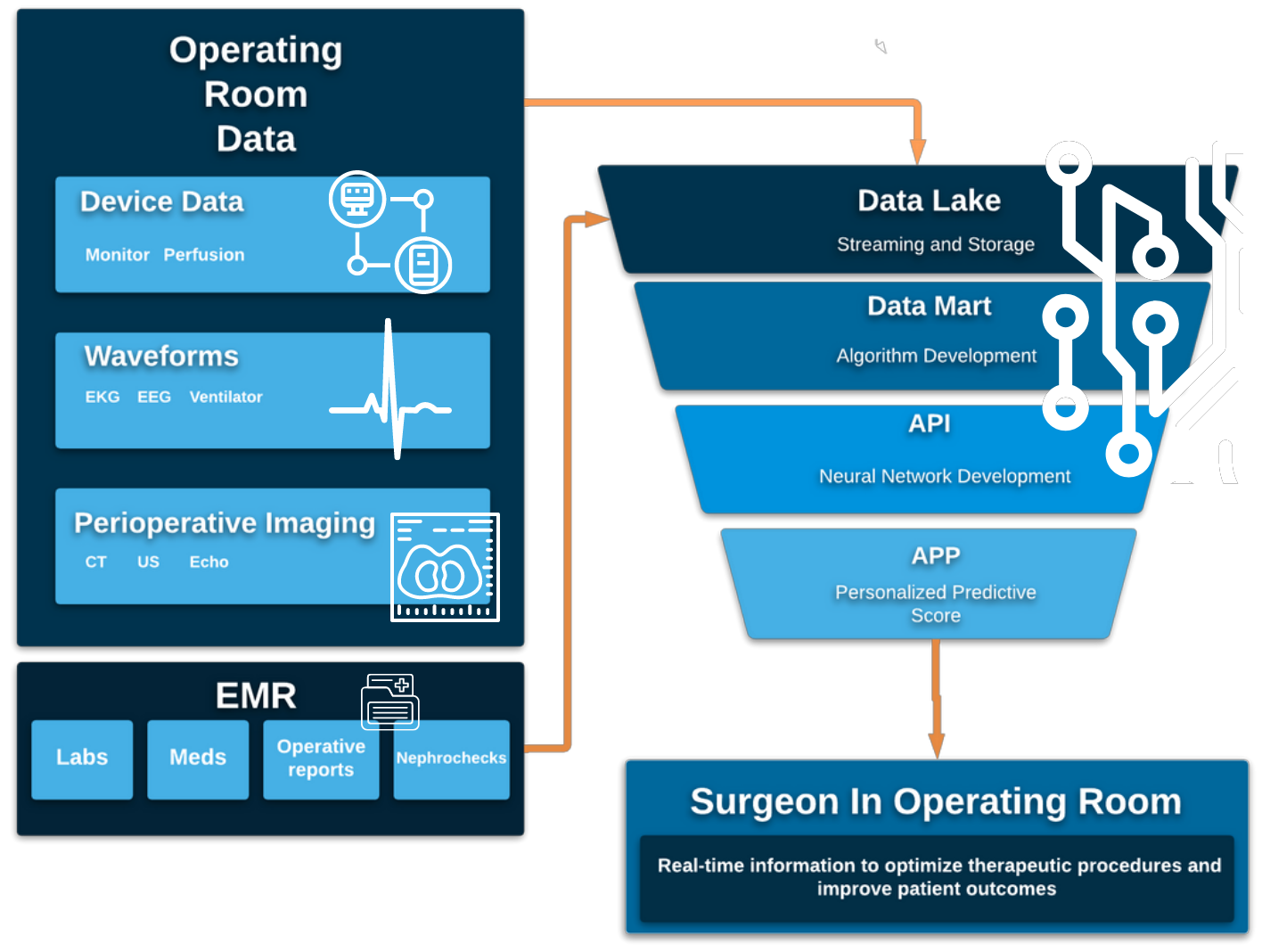Khalpey AI Lab Overview
On the forefront of medical AI innovations that help optimize patient care.
While elevating the practice of medicine to a whole new level, our lab is making the impossible possible through state-of-the-art technology that helps healthcare professionals make better- informed patient care decisions.

We are leveling the playing field for patients across the globe.
The Khalpey Artificial Intelligence Lab is a group of dedicated physicians and scientists working together to conduct patient-centered research that drives improvements in prevention, diagnosis, and treatment.
Our lab investigates the individual differences in cardiovascular disease that can ultimately be used to tailor care to a patient’s specific risk profile. Our research also informs models of patient-centered care and can be used to design more effective interventions to manage patients prior to cardiothoracic surgery.
Based at HonorHealth in Scottsdale, AZ, the program brings together multidisciplinary teams with expertise in cardiovascular epidemiology, statistics, data science, and outcomes research. Our research initiatives take a closer look at the long-term effects of the novel coronavirus (COVID-19), heart rate variability, postoperative atrial fibrillation, and frailty prior to surgery. Personalized risk management data derived from those studies is used to augment physician decision making prior to surgery.
Much of our program’s work originates from the massive amount of data collected. Our team of researchers mines comprehensive electronic health records and medical device reports, enabling us to develop highly accurate and scalable, computable phenotypes.
By fostering critical interactions among researchers, our program nurtures scientifically- promising industry collaborations with and through DataRobot, mentorships, grant proposals, and projects.

Our Mission
Claiming over 655,000(1) American lives in 2020 – or, roughly 1-in-4 deaths – heart disease is the leading cause of mortality in the U.S. Although surgery is a common intervention, the complex effects of the trauma and cardiac dysfunction on all organ and paramedical systems (genomic, transcriptomic, pharmacological, metabolomic, and epigenetic) are not well understood – resulting in suboptimal monitoring, care, and health delivery. During the recovery period, clinicians generate terabytes of precise biosensor and laboratory data without the proper tools to integrate, interpret, and predict their patients’ trajectory.
Recent work(2) in artificial intelligence (AI) is now enabling a new holistic data approach capable of considering all data-that-matters regardless of data type. Structured laboratory data can now be combined with unstructured patient history notes, laboratory studies, vital signs, medications, radiology studies, monitor waveforms, wearables, ventilator data, EEG data, clinical notes, diagnostics and demographics to deliver higher model accuracy and improved insights. Helping healthcare professionals better understand the drivers for their patients facilitates therapeutic procedure optimization and improved patient outcomes.
Sadly, the majority of patient-level data today – for instance, continuously collected data such as heartbeat waveforms – are not analyzed in a holistic manner for knowledge discovery. By integrating a standard data collection process to follow the patient before, during, and after surgery, all relevant experience can be captured for rapid knowledge discovery. Once utilized, this data standard will enable new predictive models to be trained and applied at scale to patients at any stage of their hospitalization, leading to more proactive actions rather than the more reactive behaviors that exist today.
The goal of this program is scaling our ecosystem to understand the nuances of cardiac disease by incorporating targeted source data which includes: continuously measured vital signs and waveforms, EEG waveforms, medications, laboratory results, notes, diagnostics and genomic information using biobank data (IRB#20200051) and other diagnostic results (IRB#20200195). Nihon Kohden’s digital health platform will facilitate the procurement and processing of patient data while software will provide data integration and governance capabilities of ethically-sourced data sets – allowing the multi-model data types to be robustly combined to create a holistic picture of the patient journey and ensure that access to the data by researchers is appropriate, transparent, and auditable. DataRobot’s AI/ML solutions will enable modeling of multi-modal information to accurately identify relevant data features, thereby informing and enhancing clinical decision intelligence.
These algorithms will help teach us data parameters likely correlated with clinical outcomes using new undiscovered data inputs to augment medical decision making. This approach personalizes the patient care experience by incorporating changes based on algorithm-related predictions. Our AI program provides a bridge for future cardiovascular research which supports multidisciplinary approaches to treat common clinical problems today and in the future.
